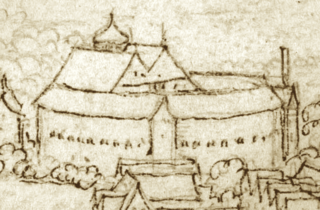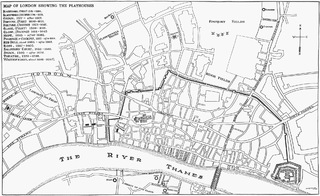Andrew Gurr | |
|---|---|
 Andrew Gurr in 2013 | |
| Born | 23 December 1936 |
| Academic work | |
| Discipline | Literary scholar |
Andrew John Gurr (born 23 December 1936) is a contemporary literary scholar who specializes in William Shakespeare and English Renaissance theatre.
Andrew Gurr | |
|---|---|
 Andrew Gurr in 2013 | |
| Born | 23 December 1936 |
| Academic work | |
| Discipline | Literary scholar |
Andrew John Gurr (born 23 December 1936) is a contemporary literary scholar who specializes in William Shakespeare and English Renaissance theatre.
Born in Leicester, Gurr was raised in New Zealand, and educated at the University of Auckland and at Cambridge University. He has taught at the Universities of Wellington, Leeds, and Nairobi (1969–73); at the latter institution he was also head of his department.
From 1976 until his retirement in 2002 he was professor of English at the University of Reading (head of department, 1979–86), where he taught Shakespeare studies and where he is now Emeritus Professor.
Gurr co-wrote a 1981 study of Katherine Mansfield (with Claire Hanson) and two books on African literature; but he is best known for his books on Shakespeare and his contemporaries, and the theatre of that historical era—books that are recognized and utilized as essential references on English Renaissance drama. He has authored a wide range of articles for both scholarly journals and general-interest periodicals, and has edited several of Shakespeare's plays and several plays in the John Fletcher canon. He was chief academic advisor to the project to rebuild the Globe Theatre in London and also advised on the construction of the Blackfriars Playhouse in Staunton, Virginia, where he has also lectured at the biannual Blackfriars Conference and for Mary Baldwin University's M.Litt/MFA Program. For ten years (1988–97), Gurr was the English editor of the Modern Language Review and also edited The Yearbook of English Studies of the Modern Humanities Research Association, in which roles he was succeeded by Nicola Bradbury. [1]

The English Renaissance theatre or Elizabethan theatre was the theatre of England from 1558 to 1642. Its most prominent playwrights were William Shakespeare, Christopher Marlowe and Ben Jonson.

Richard Burbage was an English stage actor, widely considered to have been one of the most famous actors of the Globe Theatre and of his time. In addition to being a stage actor, he was also a theatre owner, entrepreneur, and painter. He was the younger brother of Cuthbert Burbage. They were both actors in drama. Burbage was a business associate and friend to William Shakespeare.

The Globe Theatre was a theatre in London associated with William Shakespeare. It was built in 1599 at Southwark, close to the south bank of the Thames, by Shakespeare's playing company, the Lord Chamberlain's Men. It was destroyed by fire on 29 June 1613. A second Globe Theatre was built on the same site by June 1614 and stayed open until the London theatre closures of 1642. As well as plays by Shakespeare, early works by Ben Jonson, Thomas Dekker and John Fletcher were first performed here.
The King's Men was the acting company to which William Shakespeare (1564–1616) belonged for most of his career. Formerly known as the Lord Chamberlain's Men during the reign of Queen Elizabeth I, they became the King's Men in 1603 when King James I ascended the throne and became the company's patron.

Blackfriars Theatre was the name given to two separate theatres located in the former Blackfriars Dominican priory in the City of London during the Renaissance. The first theatre began as a venue for the Children of the Chapel Royal, child actors associated with the Queen's chapel choirs, and who from 1576 to 1584 staged plays in the vast hall of the former monastery. The second theatre dates from the purchase of the upper part of the priory and another building by James Burbage in 1596, which included the Parliament Chamber on the upper floor that was converted into the playhouse. The Children of the Chapel played in the theatre beginning in the autumn of 1600 until the King's Men took over in 1608. They successfully used it as their winter playhouse until all the theatres were closed in 1642 when the English Civil War began. In 1666, the entire area was destroyed in the Great Fire of London.
The Modern Humanities Research Association (MHRA) is a United Kingdom–based international organisation that aims to encourage and promote advanced study and research of humanities. It is most notable for producing the MHRA Style Guide.

John Fletcher was an English playwright. Following William Shakespeare as house playwright for the King's Men, he was among the most prolific and influential dramatists of his day; during his lifetime and in the Stuart Restoration, his fame rivalled Shakespeare's. Fletcher collaborated in writing plays, chiefly with Francis Beaumont or Philip Massinger, but also with Shakespeare and others.
Robert Johnson was an English composer and lutenist of the late Tudor and early Jacobean eras. He is sometimes called "Robert Johnson II" to distinguish him from an earlier Scottish composer. Johnson worked with William Shakespeare providing music for some of his later plays.

John Lowin was an English actor.

Shakespeare's plays are a canon of approximately 39 dramatic works written by the English poet, playwright, and actor William Shakespeare. The exact number of plays as well as their classifications as tragedy, history, comedy, or otherwise is a matter of scholarly debate. Shakespeare's plays are widely regarded as among the greatest in the English language and are continually performed around the world. The plays have been translated into every major living language.

The Cockpit was a theatre in London, operating from 1616 to around 1665. It was the first theatre to be located near Drury Lane. After damage in 1617, it was named The Phoenix.
The Lady Elizabeth's Men, or Princess Elizabeth's Men, was a company of actors in Jacobean London, formed under the patronage of King James I's daughter Princess Elizabeth. From 1618 on, the company was called The Queen of Bohemia's Men, after Elizabeth and her husband the Elector Palatine had their brief and disastrous flirtation with the crown of Bohemia.
Joseph Taylor was a 17th-century English actor. As the successor of Richard Burbage as the leading actor with the King's Men, he was arguably the most important actor in the later Jacobean and the Caroline eras.
The Beaumont and Fletcher folios are two large folio collections of the stage plays of John Fletcher and his collaborators. The first was issued in 1647, and the second in 1679. The two collections were important in preserving many works of English Renaissance drama.
Eliard Swanston, alternatively spelled Heliard, Hilliard, Elyard, Ellyardt, Ellyaerdt, and Eyloerdt, was an English actor in the Caroline era. He became a leading man in the King's Men, the company of William Shakespeare and Richard Burbage, in the final phase of its existence.
John Shank was an actor in English Renaissance theatre, a leading comedian in the King's Men during the 1620s and 1630s.

Thousands of performances of William Shakespeare's plays have been staged since the end of the 16th century. While Shakespeare was alive, many of his greatest plays were performed by the Lord Chamberlain's Men and King's Men acting companies at the Globe and Blackfriars Theatres. Among the actors of these original performances were Richard Burbage, Richard Cowley, and William Kempe.
John Underwood was an early 17th-century actor, a member of the King's Men, the theatrics company of William Shakespeare.
Thomas Pollard was an actor in the King's Men – a prominent comedian in the acting troupe of William Shakespeare and Richard Burbage.
Nicola Anne Lulham Bradbury is an English literary critic, lecturer, editor, and author, specializing in the 19th century novel.